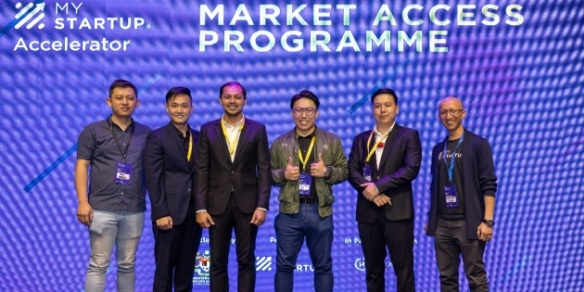30 startups from 9 nations kickoff Cohort 3 of MaGIC’s Global Accelerator Program
By Tan Jee Yee August 12, 2019
- Over US$500k perks from partners such as AWS, HubSpot, Usability Hub, others
- MaGIC CEO: Better route-to-market, more careful investment tagging focus this year

30 startups. 9 countries. Four months to stand out and make a mark in the market.
The Malaysian Global Innovation & Creativity Centre (MaGIC) has officially launched the third Cohort of its Global Accelerator Programme (GAP) with 30 startups across nine countries that include Malaysia, Myanmar, Spain, India, Russia, Estonia and more. 63% of the startups are Malaysian based.
These 30 companies certainly feel like the cream of the crop – applications of the accelerator, which opened from 10 April to 17 May 2019 drew over 1,170 applications from 68 countries. A record for GAP.
The 30 were shortlisted based on three key criteria: their prospect to expand regionally and globally; their potential of building highly scalable products with large growth potential; and being able to demonstrate a market-ready product with traction.
The four month programme will be conducted out of the MaGIC campus in Cyberjaya, with the aim of equipping all 30 local and international startups with the necessary skills, tools and network to be sustainable and ready for Southeast Asian (SEA) expansion. With GAP, the selected entrepreneurs get a head start to break into the SEA market – a region touted as a growing consumer powerhouse.
Cohort 1 and 2 of GAP has seen its fair share of success stories. These include tresGo, an e-fulfilment solutions provider for e-retailers in Malaysia (that has received an undisclosed investment sum from Cradle); JomParking, the parking solutions startup that secured US$955,000 (RM4 million) in funding from a regional private equity and venture capital firm; and Picha Eats, a social enterprise that empowers refugees and underserved communities through a sustainable food business.
Perks and mentors
Officiating the launch, Malaysian Entrepreneur Development (MED) Minister Mohd Redzuan Yusof says: “MED has been entrusted to lead the way to create a holistic, conducive entrepreneurial ecosystem that is inclusive in supporting the country's socio-economic development agenda while increasing the number of qualified, viable, resilient and global-minded entrepreneurs.
“A programme like GAP which provides exposure not only our local startups but startups from other countries too with the opportunity to work together, share learnings and different viewpoints as well as explore expansion opportunities in SEA is aligned with our efforts at MED in transforming Malaysia to be an entrepreneurial nation by 2030. I hope to see GAP Cohort 3 bring greater economic impact through revenue generation and the raising of investment.”
During the programme, participants will enjoy over US$500,000 worth of perks from MaGIC’s partners, which include Amazon Web Services, HubSpot, Usability Hub and others.
MaGIC will also be providing industry-specific training from world-class technical and business mentors; a stronger route-to-market focus with extensive corporate support, and partnerships with reputable private sector companies such as CIMB Bank, Maxis Communications and Allianz Malaysia.
Participants also get access to coworking space, accommodation, monthly stipend, a six-month professional visitor pass and marketing allowance.
GAP’s syllabus is set to include three primary modules:
- Relationship-building meetings with venture capitalists from the start of the programme
- A route-to-market week where startups will receive more information on RTM partners as well as coaching on how to pitch on individual companies
- ASEAN Expansion Week, where key community builders from around the region will share growth strategies and resources that the startups can leverage

Continuous improvements
MaGIC CEO Dzuleira Abu Bakar notes that there’s always room for improvement between each cohort. “We usually try and make it more targeted,” she says, elaborating that once GAP has started, they usually try to understand the needs of the cohort and connect them to the right mentors and network.
“What we’re looking for this year is better route-to-market for these startups, as well as more careful investment tagging,” she adds. This focus has come from the learnings of previous cohorts where startups want better route-to-market and also early engagement with investors.
“It’s important to socialise the idea with the investor community. It’s a courting process. With this cohort, we expect to do that much earlier.”
With IR4.0 (the fourth industrial revolution) being something that is promoted by the government, there is a question as to whether it affected the startup selection process.
Dzuleira says that was not the case (ultimately, the startups can be in any business or tech vertical so long they fit the aforementioned criterias), though the startups of this year certainly show a tendency towards business and enterprise solutions.
“Usually it’s more reflective of trends. If you see a lot of consumer facing products or companies in a year, then that year you’ll observe more startups in the program that lean towards that,” she says. “Somehow, the shift or trend this year is a lot more around IR4.0.”
Interestingly, Dzuilera notes that, in the future, MaGIC may want to explore a more thematic-based approach for their accelerator programmes. They have yet to decide on which vertical to focus, but there are benefits to break the programme down into different verticals. For one, MaGIC will be able to provide more targeted assistance.
“We may be able to curate a group of route-to-market partners that need solutions in that vertical,” she says as an example. “We can also curate a list of investors that want to invest in that vertical.” But they won’t run away from a more general acceleration mode, Dzuleira notes.
The 30 startups began their journey on 9 August 2019, and will be presenting their refined ideas to a room of eager investors in November 2019.
Related stories:
Ecosystem need to be more connected for economy to thrive
Final call to Cohort 3 of Southeast Asia’s best accelerator programme
DWEN 2019: Great time for women to be entrepreneurs, but there are still gaps to fill


